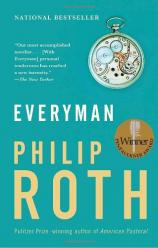Everyman
Review
Everyman
The jacket cover of Philip Roth's new novel, EVERYMAN, explains the title: "EVERYMAN takes its title from an anonymous fifteenth-century allegorical play, a classic of early English drama, whose theme is the summoning of the living to death." While correct, this description leaves out the crux of the original play. In the play, translated sometime soon after 1485, the protagonist, named Everyman, moves rapidly towards death; as the Day of Judgment approaches, each one of his friends leaves him, except for Good Deeds. The ostensible moral is therefore overt: Nothing of your physical life will help you at the time of judgment except for your good deeds. Further, this dramatized allegory propagates that the personified traits --- aside from good deeds --- will only hinder one's quest for purity and salvation.
Roth's EVERYMAN mirrors the original play. An unnamed protagonist faces ubiquitous morbidity and he remains obsessed with his own finality and mortality. As the protagonist's life moves on, everyone he loves fades away, often pushed away by faults of his own.
Everyman's first wife bears him two sons who come to loathe him --- they see him as having abandoned the family. His second wife brings him a loving daughter, really the only character who actually maintains a relationship with him. She celebrates his artistic talent and forgives him for his indiscretions. Her mother, however, never forgives Everyman. The third wife, a beautiful but seemingly vacuous model, produces nothing for Everyman except an erotic hole.
On top of the philandering and chronic divorce, there is a contrite tale of death. The first experience comes for the protagonist when he is a young boy. He witnesses a bloated soldier being pulled from the water at a beach near his house in New Jersey. The early experience with death leaves the protagonist craving to believe in his father's proclamation that a diamond truly exemplifies impermanence. His vehement adherence to this statement leads to the innumerable hours he spends working in his father's jewelry store as a child.
This belief in his father's ideal that real continuity comes in the form of a diamond lasts throughout his entire life. Many years later, when he purchases diamonds for his third wife soon before their relationship dissolves, he ogles the diamonds and inspects them meticulously, borrowing the jeweler's magnifying glass. Everyman cares less about the diamonds as a gift for his girlfriend and more so as a reminder of the stability and virility of childhood that he longs for as a moribund adult.
When, only several years after his encounter with the soldier, Everyman lies in a hospital bed waiting to have surgery for a hernia, he again faces his mortality and realizes that one is living only to eventually die --- the world is an enormous sepulcher. Then there is a ruptured appendix and a resulting infection, the same ailment that killed his uncle and that came very close to killing his father. And years later, seven operations are needed in seven consecutive years for arterial clogs and a pacemaker. The disillusioning process of continued ailments leaves Everyman in a kind of self-imposed isolation, and his anger at the world cuts him off from those he loves.
In the midst of endless morbidity, isolation and sadness is beauty. The reminiscences of a childhood spent in a diamond store with adoring parents and a brother whom Everyman worships illuminate a seemingly pitch black landscape. Nancy, Everyman's loving daughter, displays forgiveness, caring and a continuing lineage of parent/child devotion. Musings on art, love and adoration brighten Everyman's days. At the end, however, there is only death. And oddly enough, the only solace in his life comes while looking at his parents' graves, discussing the minutiae of digging graves with a caring but simple gravedigger.
This dark novel, marked by deterioration and suffering, works precisely because of its ephemerality. The book reads in one or two sittings, and the characters fly by in a similarly befitting fashion. Like the original play, Roth's work is a kind of morality tale, and an immensely enjoyable one at that. The writing is beautiful and the story superb. Amidst so much death and morbidity is the joy of life.
Beauty, Strength, and Discretion do man forsake,
Foolish friends and kinsmen that fair spake-
All fleeth save Good Deeds, and that am I
EVERYMAN, 871-873
Reviewed by Scott Handwerker on January 21, 2011
Everyman
- Publication Date: April 10, 2007
- Genres: Fiction
- Paperback: 182 pages
- Publisher: Vintage
- ISBN-10: 0307277712
- ISBN-13: 9780307277718





